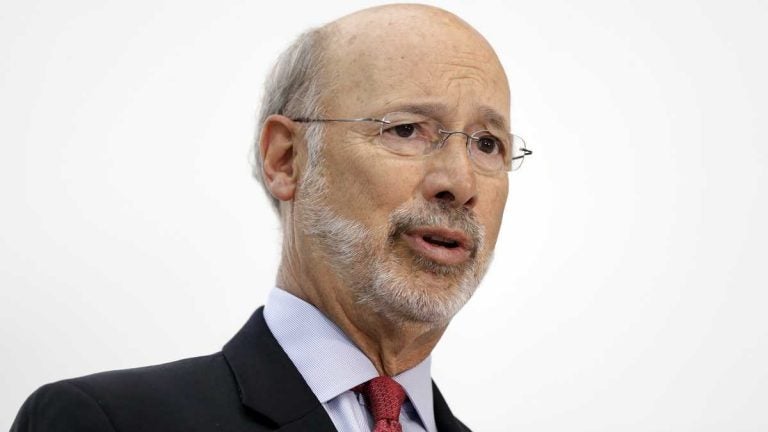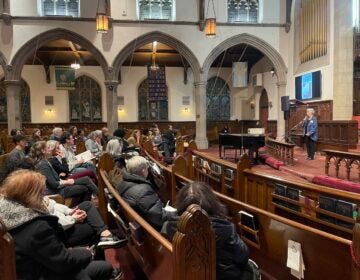Gov. Wolf emphasizes education, but scales back funding ambitions during final first term budget address
Pennsylvania Governor Tom Wolf asked the General Assembly Tuesday for another $100 million in basic education spending and $20 million for special education.
Listen 2:47
Pennsylvania Gov. Tom Wolf (Matt Rourke/AP Photo, file)
Pennsylvania Governor Tom Wolf asked the General Assembly Tuesday for another $100 million in basic education spending and $20 million for special education — his smallest request since taking office in 2015.
Wolf also proposed a $40 million bump in pre-K spending, $15 million more for the state’s system of higher education, and $10 million for career and technical education.
“Rebuilding our schools is the beginning of rebuilding our economy,” Wolf said during his budget address.
The relative modesty of Wolf’s ask likely reflects political realities, said education advocates. With the governor facing re-election in November — and his counterparts in the legislature facing the same — there’s little appetite for raising taxes to generate a large chunk of new revenue.
“We’d like to see him be asking for more money for education funding, but we understand the practical realities,” said Marc Stier of the Pennsylvania Budget and Policy Center, a left-leaning Harrisburg think tank.
If Wolf gets the money he requested, the state would spend just under $6.1 billion on basic education next year. That’s roughly $570 million more than the state doled out during the 2014-15 school year, before Wolf’s first budget went into effect. Special education funding, meanwhile, will have gone up about $95 million over four years if the legislature approves Wolf’s latest proposal.
Basic and special education are the largest discretionary items in the state’s K-12 budget, and Wolf made increased education spending a central part of his 2014 gubernatorial campaign.
In his first proposed budget, three years ago, Wolf called for an immediate $400 million increase in basic education spending and a $2 billion bump in total K-12 education spending over his first term.
In the months after Wolf’s request, he and top Republicans in the legislature waged a months-long budget battle. It ended in March of 2016, nearly nine months after the state’s deadline, when Wolf refused to sign the General Assembly’s spending bill and allowed it to pass into law.
It was a bruising political fight that saw school districts borrowing money and dipping into reserves to get by without their typical state subsidies. Since then, even with Wolf calling for smaller funding asks, he and the legislature have failed to complete an on-time budget.
This year, Wolf appears keen to avoid that outcome.
| YEAR | BASIC ED. REQUEST | SPECIAL ED. REQUEST |
| 2015 | $400 million | $100 million |
| 2016 | $200 million | $50 million |
| 2017 | $100 million | $25 million |
| 2018 | $100 million | $20 million |
Advocates say the fact that Wolf asked for an education spending increase while keeping most other budget lines flat shows the issue is still a priority. Still, they believe the state has to do much more.
“Our children need more,” said Deborah Gordon-Klehr of the Education Law Center, which is part of a coalition suing the state for what it considers insufficient school funding. “It’s going to take significantly more investment to close the outstanding gaps that exist.”
Gordon-Klehr said the lingering gap between what Wolf has proposed and what she believes schools need further proves the importance of the education funding lawsuit, which is currently before Pa. Commonwealth Court. If successful, it could eventually compel the legislature to raise the revenue for billions more in school dollars.
Through three budget cycles under Wolf, the state has increased basic education by $469 million, which is about a third of the increase Wolf initially said was necessary.
The chart below shows how much the state spent on various major education line items the year before Wolf took office and how much the state booked to spend during last year’s budget debate.
| LINE ITEM | 2014-15 SPEND | 2017-18 SPEND | DIFFERENCE |
| Basic Education | $5.53 billion | $5.96 billion | +$469 million |
| Special Education | $1.05 billion | $1.12 billion | +$75 million |
| Pre-K Counts | $97.28 million | $172.28 million | +$75 million |
| Total Education (K-12 only) | $9.61 billion | $11.07 billion | +$1.46 billion |
Note: The total education calculation excludes money appropriated for libraries, community colleges, and pre-K initiatives. It does, however, include spending on social security and retirement for school employees.
Republican leaders say they aren’t opposed to the spending increases Wolf outlined in Tuesday’s speech. They do, however, question whether the new money will improve student outcomes.
“We have to have accountability and we have to set measurements and we’ve got to achieve them for the money that we’re spending,” said Speaker of the House Mike Turzai, an Allegheny County Republican hoping to win his party’s nomination for this year’s gubernatorial race.
Turzai and other GOP leaders want to see the state expand school choice options such as charter and private schools. Wolf didn’t mention the state’s oft-criticized charter law in his 20-minute speech or the private school tax credit programs many Republicans favor.
“Funneling more money into failing schools is not the silver bullet to fix our schools that Governor Wolf has promised,” said Stephen DeMaura of Excellent Schools PA, which lobbies for school choice expansion. “The time to take action on intervening in Pennsylvania’s lowest-achieving schools and conduct meaningful turnaround efforts is now.”
In his speech, Wolf did mention one of what he counts as a signature education accomplishment, the creation of a bipartisan funding formula for dispersing school dollars.
“Working together is how we enacted a fair funding formula in our education system that takes politics out of the school funding decision,” Wolf said.
The new student-weighted formula provides logic and rationality to funding decisions that were often lacking under the previous distribution model. The formula is only used, though, to dole out the new money that’s been allocated since 2016 — a small percentage of the whole.
One area of common ground between Wolf and Republicans was his proposed $10 million boost for career and technical education. Wolf dedicated a significant portion of his speech to the topic, calling out a young man from Montgomery County who used state-funded training to start a career in advanced manufacturing.
“There are some areas we’re encouraged with,” said House Majority Leader Dave Reed (R-Indiana), who’s currently running for Congress. “Particularly the focus on career and technical education and workforce development.”
WHYY is your source for fact-based, in-depth journalism and information. As a nonprofit organization, we rely on financial support from readers like you. Please give today.






